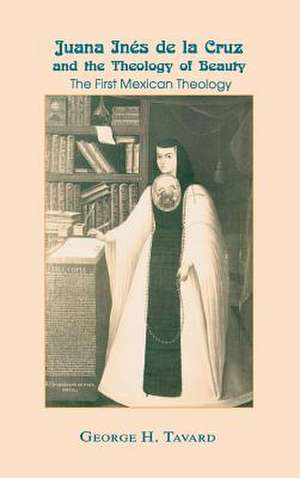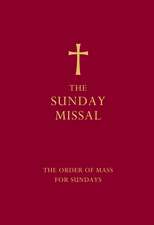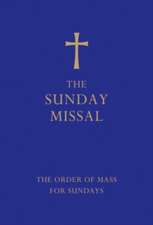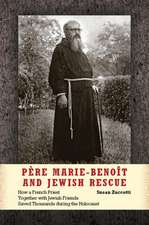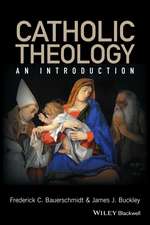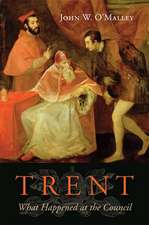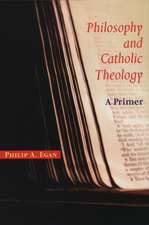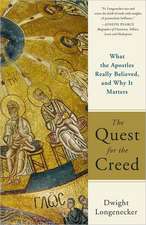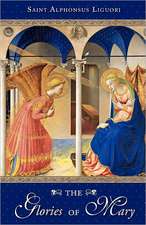Juana Inés de la Cruz and the Theology of Beauty – The First Mexican Theology
Autor George H. Tavarden Limba Engleză Hardback – 1991
| Toate formatele și edițiile | Preț | Express |
|---|---|---|
| Paperback (1) | 236.93 lei 6-8 săpt. | |
| MR – University of Notre Dame Press – 5 apr 2004 | 236.93 lei 6-8 săpt. | |
| Hardback (1) | 589.56 lei 6-8 săpt. | |
| MR – University of Notre Dame Press – 1991 | 589.56 lei 6-8 săpt. |
Preț: 589.56 lei
Preț vechi: 765.67 lei
-23% Nou
Puncte Express: 884
Preț estimativ în valută:
112.85€ • 122.62$ • 94.85£
112.85€ • 122.62$ • 94.85£
Carte tipărită la comandă
Livrare economică 21 aprilie-05 mai
Preluare comenzi: 021 569.72.76
Specificații
ISBN-13: 9780268012069
ISBN-10: 0268012067
Pagini: 246
Dimensiuni: 152 x 229 x 18 mm
Greutate: 0.53 kg
Ediția:1
Editura: MR – University of Notre Dame Press
ISBN-10: 0268012067
Pagini: 246
Dimensiuni: 152 x 229 x 18 mm
Greutate: 0.53 kg
Ediția:1
Editura: MR – University of Notre Dame Press
Recenzii
"This theological analysis of de la Cruz's life and work will interest readers seeking a fuller understanding of one of the 17th century's most fascinating figures." --Library Journal
Notă biografică
George H. Tavard (1922—2007) was visiting professor at Princeton Theological Seminary, the Josephinum School of Theology, Marquette University, Hekima School of Theology in Nairobi, Kenya, Regis College at the University of Toronto, and the Catholic University of America. He attended Vatican Council II as a "peritus conciliaris," named by Pope John XXIII, and consultant to the Pontifical Secretariat for the Unity of Christians.
Descriere
With Juana Inés de la Cruz and the Theology of Beauty, George H. Tavard presents the first thorough investigation of the theology of the greatest Latin American poet before our own time. HIs program is all the more important because she was the first woman of this continent to assert the right of women to study to the full extent of their capacities. An intelligent and intellectual woman, Juana Inés was eager to live a life of scholarship and felt “a great aversion to matrimony,” which directed her to enter the convent in 1667. Tavard provides a thought-provoking analysis both of the theological ideas that Juana Inés expressed in poetry and prose and of the conclusions, provisional or definitive, she may have reached about herself and about humanity.
Through a close study of many of her clearly authenticated works--her didactic poem, Primero Sueño (First Dream); her poems in honor of the saints; her religious drama; her poems in honor of Christ and the Virgin; her lyric verse on devotional themes; and her prose writings on religious topics--Tavard draws out Sor Juana’s conception of the world and the soul, her ideas about the saints, her understanding of the Virgin, and her Christology. He offers a coherent theological and spiritual argument for Juana’s renunciation of further writing in 1692. In discussing the shape of her theological imagination, Tavard concludes that for Juana, “the physical and spiritual beauty of creatures, a gift of God’s love, acts as a theopany” through which divine glory is perceived.
Through a close study of many of her clearly authenticated works--her didactic poem, Primero Sueño (First Dream); her poems in honor of the saints; her religious drama; her poems in honor of Christ and the Virgin; her lyric verse on devotional themes; and her prose writings on religious topics--Tavard draws out Sor Juana’s conception of the world and the soul, her ideas about the saints, her understanding of the Virgin, and her Christology. He offers a coherent theological and spiritual argument for Juana’s renunciation of further writing in 1692. In discussing the shape of her theological imagination, Tavard concludes that for Juana, “the physical and spiritual beauty of creatures, a gift of God’s love, acts as a theopany” through which divine glory is perceived.
